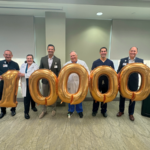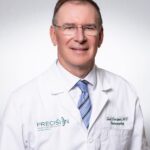 "Addiction is never just addiction; it’s addiction plus something else. And I think we’re really good at figuring out the ‘something else’." That’s how Dr. Christopher La Tourette La Riche describes the work he does when helping patients at Lucida Treatment Center.
"Addiction is never just addiction; it’s addiction plus something else. And I think we’re really good at figuring out the ‘something else’." That’s how Dr. Christopher La Tourette La Riche describes the work he does when helping patients at Lucida Treatment Center.
Dr. La Riche said about his work, "We treat addictive disorders and substance abuse disorders – although the word ‘abuse’ isn’t used anymore, because that was quite stigmatizing. So we started using the term ‘substance use’ disorders." Dr. La Riche explained that addictive disorders "cause chronic changes in brain circuits leading to the pathological pursuit of reward (by using substances), despite the hazardous consequences." In other words, people continue to do something that initially gives them pleasure, even though they know the considerable risks that are involved.
He gave an example of a physician who did lines of cocaine in between seeing patients, arguing that it didn’t affect his work; but he eventually got caught and lost his license. "The hazardous consequences are so clear in someone so obviously intelligent, and yet they continue to do it. They have a pathological pursuit – and we all have the same reaction: How could you be so foolish? How could someone so smart make such absolutely poor decisions? It boggles the mind and has nothing to do with intelligence, or lack thereof – and that’s what is so fascinating about addiction."
Because he believes that addiction doesn’t stand alone, Dr. La Riche said he looks at the "something else" involved, and he explained a number of ways that is accomplished – starting with a thorough psychiatric evaluation assessing for comorbidities such as bipolar disorder and PTSD; a close look at bloodwork, vitamin levels, electrolyte levels, hormone functioning, etc.; and a detailed evaluation from multiple providers who evaluate psychological, early-life and neurological aspects. "We’re very evidence-based, that’s what we pride ourselves on. I’m the medical director (at Lucida), and I’m an addiction psychiatrist. There are very few addiction psychiatrists in the world."
He said many people think abstinence and a different lifestyle are all that’s needed to change, but he doesn’t fully agree. "We know so much about the brain and we know that’s just not the full picture. Abstinence and lifestyle changes alone can be effective in some – but not all – people with addiction. What’s needed are long-term changes in the brain along with lifestyle changes. It’s not a character flaw or a moral weakness. It’s quite complex, so we offer the best evidence-based treatment."
As an example, Dr. La Riche said maintenance treatments can be offered to some patients who are addicted to opiates, explaining that there are substitutes that can be taken every day, and the person reaches a state where he or she can function extremely well. "It’s not like getting high or intoxicated. It doesn’t get people addicted; in fact it saves lives and decreases addiction. For a certain subset of patients addicted to opiates, opiate maintenance treatment (along with lifestyle changes) provides the best outcomes and has been studied extensively for decades. For other opiate-addicted patients, abstinence and lifestyle changes alone will provide good outcomes."
The passion in Dr. La Riche’s voice is evident as he talks about his work, and he said he became interested in this field because he loves the outsider, those who others say are not going to make it or who are beyond hope. "I love those people and I love proving everyone else wrong. I believe they deserve care and kindness and medical expertise just like anyone else. We can turn things around."
In addition, Dr. La Riche speaks six languages – English, Italian, Portuguese, Spanish, German and French – and treats patients in all of them. "I used to have a practice in Miami and I think I was the only psychiatrist seeing Brazilians because there was no one who spoke Portuguese."
Dr. La Riche is the medical director at Lucida in Lantana, but Lucida is part of Elements Behavioral Health, which comprises treatment centers around the country. Dr. La Riche said the first one he heard about was Promises Treatment Malibu. "I went out there to see what they were doing, and I was so impressed with how they delivered their mental health care. So they were opening a new facility in Palm Beach County, and I was in Miami. I heard about it and I said if Elements is connected with this, I want to know about it. Then I realized I could be a part of something new and growing and contribute a lot and learn a lot myself. I wasn’t planning it, but I jumped at the chance."
Dr. La Riche commented, "People often say that I must have a really tough job. But no, it’s very encouraging. I would say, one to two times a month, one of my patients says thank you so much, you really saved my life. It happens all the time – and I get paid for this. Not bad!"
No, not bad at all – for Dr. La Riche or for his patients.


























